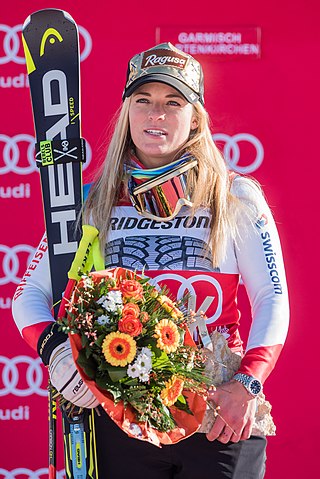
The International Ski Federation (FIS) Alpine Ski World Cup, the premier circuit for alpine skiing competition, began in January 1967, and the 2019–20 season marked the 54th consecutive year for the FIS World Cup. As it had every year since 2006, the season began in Sölden, Austria in October. The season was supposed to end with the World Cup finals in March, which were to be held in Cortina d'Ampezzo, Italy for the first time since they began in 1993, but the finals were cancelled due to the COVID-19 outbreak in Italy.

The women's super-G in the 2021 FIS Alpine Skiing World Cup consisted of 6 events, with one cancellation from the scheduled seven. Swiss skier Lara Gut-Behrami won four of the first five Super-Gs to establish an 195-point lead over Swiss teammate and defending discipline champion Corinne Suter with only two races to go, and she clinched the discipline title for 2021 after the sixth event, which turned out to be the last one for the season.

The men's downhill in the 2021 FIS Alpine Skiing World Cup consisted of seven events. The original schedule had contained nine downhills, but a rescheduled one on 5 March in Saalbach-Hinterglemm, Austria, was canceled due to fog and continual snowfall after just nine skiers had finished, and the downhill during World Cup finals week was also canceled.

The men's super-G in the 2021 FIS Alpine Skiing World Cup consisted of six events, although seven had been originally scheduled.

The men's downhill in the 2020 FIS Alpine Skiing World Cup consisted of nine events, with only one cancellation from the scheduled ten.

The men's giant slalom in the 2020 FIS Alpine Skiing World Cup involved seven events, as the last two scheduled giant slaloms in the season were cancelled.

The men's slalom in the 2020 FIS Alpine Ski World Cup involved only nine events, as the final three scheduled slaloms of the season were cancelled.

The Men's combined in the 2020 FIS Alpine Skiing World Cup involved 3 events, all of which were completed before the season was halted due to the COVID-19 pandemic. A major change was made in the discipline this season due to the recent dominance of slalom specialists in the combined over speed racers. As was previously the case, the first run continued to be the speed discipline. The second run then started in reverse order of finish in the speed run, which allowed the slalom specialists to tackle fresh snow as the first down the hill in the slalom run, while the speed specialists had to face the more challenging rutted snow at the end of the day, as the last skiers of the 30 who qualified for the second run. Instead, the second run was changed to start in the same order as the finish of the speed run, so that the leader after the speed run became the first to race on the fresh slalom course.

The men's overall in the 2020 FIS Alpine Skiing World Cup consisted of 36 events in 6 disciplines: downhill (DH), Super-G (SG), giant slalom (GS), slalom (SL), Alpine combined (AC), and parallel (PAR). The season was originally scheduled to have 44 men's races plus a mixed team event, but a race in Japan plus final the seven men's races and the mixed team event were all cancelled, as discussed below.

The women's super-G in the 2022 FIS Alpine Skiing World Cup consisted of nine events including the final. Although no Italian woman had ever won the super-G championship, the battle in 2021-22 was between three of them: speed specialists Sofia Goggia and Elena Curtoni plus 2020 overall champion Federica Brignone. Through the first six races, Curtoni had won one, and each of the others had won two. However, Goggia was injured in a crash in the sixth race, in Cortina d'Ampezzo, and missed the next set of speed races as well as the super-G in the 2022 Winter Olympics. The seventh race, which was held days before the Winter Olympics, was skipped by many of the other top competitors, but was won by Brignone, enabling her to open a sizable lead in the discipline, and Brignone was able to clinch the season championship in the next Super-G when neither Curtoni nor Goggia scored points.

The men's downhill in the 2022 FIS Alpine Skiing World Cup included eleven events including the final. A scheduled downhill on 5 December 2021 at Beaver Creek, Colorado was cancelled due to bad weather, but after several abortive attempts to run it at other venues, it was finally added to Kvitfjell on March 4, the day before the previously-scheduled race.

The men's super-G in the 2022 FIS Alpine Skiing World Cup consisted of seven events including the final. A race originally scheduled for Lake Louise in November and then rescheduled to Bormio in December was cancelled twice and was thought unlikely to be rescheduled, potentially reducing the season to six events. However, the race was rescheduled to Wengen on 13 January 2022. After this race, 2016 champion Aleksander Aamodt Kilde of Norway had won three of the five completed races and led the discipline; two other races were within 100 points of his lead, although no one was closer than 60 points behind. Kilde then clinched the discipline championship for the season in front of a home crowd by winning the next-to-last race of the season in Kvitfjell.

The women's super-G in the 2023 FIS Alpine Skiing World Cup included eight events, including the final. The original schedule called for nine events, but a scheduled downhill at St. Anton on 14 January was converted to a super-G due to the inability to hold pre-race practice runs on either of the two days prior to the event. A later super-G at Cortina was converted into a downhill to restore the original schedule balance, but then a downhill at Crans Montana on 25 February had to be delayed a day due to fog and dangerous course conditions, and the super-G previously scheduled for that day was cancelled and not rescheduled.

The men's downhill in the 2023 FIS Alpine Skiing World Cup consisted of ten events, including the final. The season had been planned with fourteen downhills, but early in the season, two scheduled downhills on 29/30 October 2022 on the Matterhorn, running from Switzerland (Zermatt) into Italy (Cervinia), were canceled due to lack of snow and not rescheduled. Later in the season, a downhill scheduled for Garmisch-Partenkirchen on 28 January 2023 was also cancelled for lack of snow and not rescheduled. Finally, on 3 March, a scheduled downhill at Aspen was canceled due to poor visibility and deteriorating weather conditions, even though 24 racers had already started. The first out of the starting gate, Norway's Adrian Smiseth Sejersted, held the lead and was hoping for six more competitors to start so that the race would become official, but the weather conditions prevented that.

The men's super-G in the 2023 Alpine Skiing World Cup consisted of eight events, including the final. The season was originally planned with eight races, but two were cancelled early in the season and were not planned to be rescheduled. However, when two races planned at Garmisch-Partenkirchen on 28-29 January 2023 were cancelled due to a lack of snow, the two previously-cancelled Super-G races were rescheduled on those dates at Cortina d'Ampezzo, restoring the original Super-G schedule plan.

The men's super-G in the 2019 FIS Alpine Skiing World Cup involved seven events. Italian skier Dominik Paris seized the lead in the discipline from Vincent Kriechmayr of Austria by winning the next-to-last Super-G of the season in Kvitfjell, then won the crystal globe for the season by also winning the final in Soldeu, Andorra.

The men's super-G in the 2018 FIS Alpine Skiing World Cup involved six events including the final in Åre, Sweden. Norwegian skier Kjetil Jansrud, the defending champion in the discipline, won two of the first five races and finished second in two more, clinching the crystal globe for the season before the final.

The men's super-G in the 2017 Alpine Skiing World Cup involved six events, including the finals in Aspen, Colorado (USA). Although Norwegian skier Aleksander Aamodt Kilde was the defending champion in the discipline, fellow Norwegian Kjetil Jansrud won the first three Super-G races of the season. With only six events in the discipline, Jansrud then clinched the season championship before the finals merely by finishing seventh in the fifth Super-G of the year in Kvitfjell, Norway.

The men's super-G competition in the 2016 FIS Alpine Skiing World Cup involved eight events, including the finals in St. Moritz, Switzerland.

The men's giant slalom competition in the 2016 FIS Alpine Skiing World Cup involved eleven events, including the first-ever parallel giant slalom and the season finals in St. Moritz, Switzerland. The newly introduced Parallel giant slalom event at Alta Badia, Italy was a relatively short Giant slalom course that pitted the men against one another in a modified bracket-reduction format from a field of thirty-two qualifying skiers, eventually whittled down to just four final-round racers in a "large final" and a "small final".











